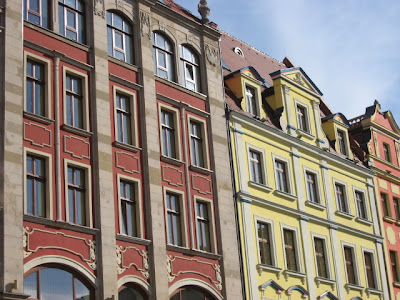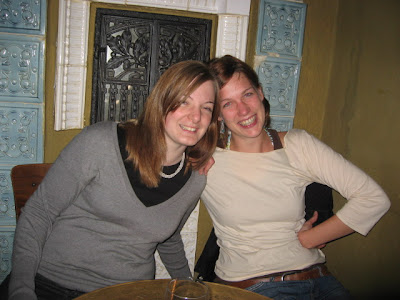 My father's old apartment building.On my second day in Wroclaw, Ciocia Janka took me to the city's most famous sight: the Raclawice Panorama. Basically, you go into this room that is in the shape of circle, and there is a giant continuous painting wrapped inside of it, depicting a historical battle between Russians and Polish peasants, led by the famous Polish general, Tadeusz Kasciuszko. You have to walk around a circular balcony to view it all, and it looks so realistic that it is almost three-dimensional.
My father's old apartment building.On my second day in Wroclaw, Ciocia Janka took me to the city's most famous sight: the Raclawice Panorama. Basically, you go into this room that is in the shape of circle, and there is a giant continuous painting wrapped inside of it, depicting a historical battle between Russians and Polish peasants, led by the famous Polish general, Tadeusz Kasciuszko. You have to walk around a circular balcony to view it all, and it looks so realistic that it is almost three-dimensional.
Janka also took me to another famous sight in Wroclaw--well, at least, according to my family--the building where my father used to live. It was grey and square and run down, with no balcony to stand on or lines to get in, but I found it more interesting than a big famous painting.
From that point on, my tour guide changed hands and I was now being led around the city by the younger generation, starting with my forty-something cousin Jarek. There was something about Jarek that I liked right away. He didn't have a lot to say, sometimes he just wore a bemused smile, but to me, he looked like my family. He had the same chocolate brown eyes as my dad with small crinkles around them that gave me the impression he wore that smile often. His wife Jola and nearly 3-year-old daughter Justyna accompanied us on the tour.
Jarek drove really fast. After the light, he would switch the gears on his manual car quicker than I have ever seen anyone do so. From the driver's seat, he would point out the other relevant sights of town: "This is where your aunt lived." "This is where your father went to school." This is where Bolek worked." I would crane my neck to look at these places of history but they went by my window in a blur.
We went to this restaurant the couple frequented often. Inside looked both like an office building and a florist. The ceilings were syrofoamy and white, with bad lighting, and then there were plastic flowers everywhere. Jarek joked with the hostess and the waiter; they knew him. He told me that he and Jola had their wedding reception at this place. We all ordered salmon smothered in yellow cheese. It tasted better than it sounds.
Since it was a beautiful day, we went to a Japanese garden and walked around. Most of the flowers were no longer in bloom, so instead I observed 3-year-old Justyna. Like me, she was also learning how to speak Polish. She knew her stuff. If we were walking on sand, she would point to the ground and shrill, "SAND!" Her other strategy was to restate everything we had just said.
"Look at the fish!" her father would say as we walked by a pond.
"There is a fish!" she would answer.
I felt as if I followed her masterful language techniques, I could perhaps speak as well as she can.
Next, I was dropped into the hands of Dorota. My second cousin, Dorota is the daughter of Henryk, who is Ania and Bolek's son and Jarek's brother. She is one year younger than me, so Ania and Bolek thought we could enjoy Wroclaw at night together, as young people do. They encouraged it and fretted about it. I wasn't exactly sure why, but then I met her.
Oh Dorota. She is one year younger than me, but we couldn't be more different. She has yet to finish her studies at the university and is currently unemployed so she borrows money from her grandparents. But she isn't dumb. She speaks German fluently and is interested in politics, history and David Lynch films.
Dorota ended up taking me to a little pub that absolutely charmed me. I bought the first round (naturally) and we sat drinking wine, speaking Polish and listening to an energetic piano player. Here I learned not only that she is fast-talking and chain-smoking woman, she has an internet boyfriend and is an absolute Wroclaw loyalist: she can't imagine living anywhere else.
When we were finished with our drinks, she suggested we walk around the city, but we made a stop at a liquor store to get a beer.
It was an interesting scene. First of all, it was packed for a Sunday night. The tall, skeletal man behind the counter had dark circles under his eyes and had greasy hair that looked like he hadn't showered in a week. The place sold all kinds of alcohol but mostly rows and rows of single cans of beer which people were buying by the handful. Dorota bought a beer to walk around with, and I bought a candy bar. After I paid, a dirty man behind me, who I had seen collecting money at the front of the door, dropped a handful of change onto the counter to get one beer. It was one of the most depressing sights I have ever seen.
Dorota and I walked to the beautifully illuminated cathedral, she with beer in hand, me with my Kit Kat. I kind of felt like I was 18 years old again. Nowhere to go because we (well, one of us) had no money and drinking beer like we weren't supposed to. I didn't say anything because I really wanted an authentic experience, and here I was getting it. This was Dorota's Wroclaw: the city that she loved.
We spoke a lot in Polish. I told Dorota about my workaholic ways in New York. She said that she didn't like to work. I said that there has to be some kind of balance. We came back to the apartment around 10:30, and Dorota got yelled at for bringing me home so late. Oh, Dorota. Oh, old people.
The next day, I was back on the train back to Krakow. An entire city, three generations of family, I could barely wrap my mind around it. Arriving at Krakow Glowny, I felt a sense of relief. I was lighter, better. The drawer of my family past was open. I was letting people in.
 Justyna: Masterful Polish linguist.
Justyna: Masterful Polish linguist. Jarek, Justyna and Jola at the Japanese garden.
Jarek, Justyna and Jola at the Japanese garden.
 Lively Dorota.
Lively Dorota.
 Bolek, Janka and Ania wave good-bye at the train station.
Bolek, Janka and Ania wave good-bye at the train station.






















































